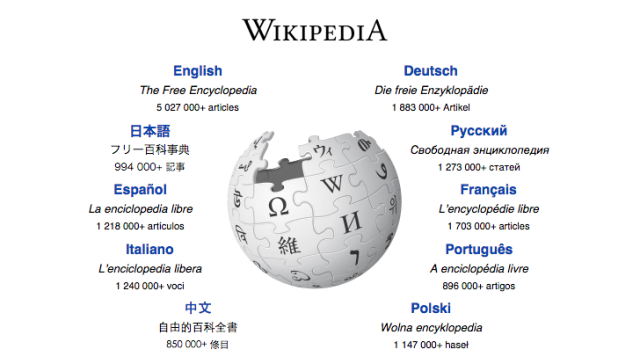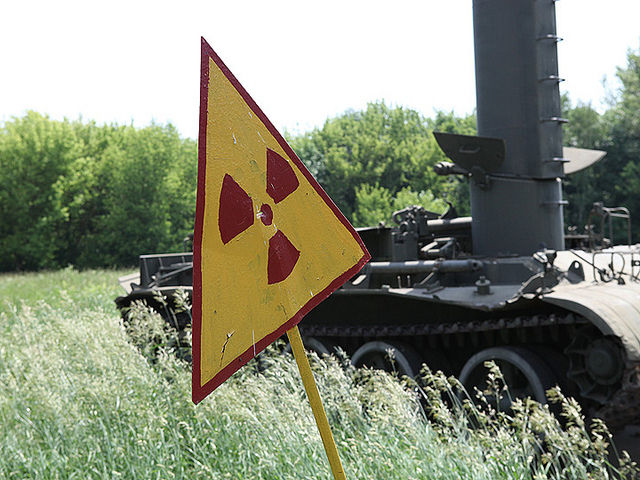
Today is Wikipedia's 15th anniversary. The digital, collaborative encyclopedia has grown quickly and today boasts articles in hundreds of languages. Those articles are managed by 80,000 volunteers who make 15,000 edits an hour according to the site's own statistics.
Over its lifespan Wikipedia has naturally encountered its share of problems: teachers loathe it because it gives lazy students a chance to cut and paste, bias sneaks (or barges) into all manner of topics (as you might expect from a crowd-sourced fact book), and controversy is part of its behind-the-scenes culture. But from the time the site launched in 2001 to today, we've spent an endless amount of time with it. We've learned one thing for sure—Wikipedia remains a good way to get a quick summary on just about any topic you can think of. Thankfully it's also a great way to find references to more reliable sources on said topic.
To celebrate its latest milestone internally, the Wikimedia Foundation announced the launch of a new Wikimedia Endowment which will be used to support Wikipedia's continued growth. The foundation says it hopes to raise more than $100 million over the next 10 years.
Our celebration will be less grand. Ars staffers got together to recount everyone's favorite past time—browsing further and further down the Wikipedia rabbit hole. These are the handful of articles that have most fascinated us over the years, and if you have your own, feel free link up in the comments.
Geopolitical fact bombs

As friends and family can attest, I’m fond of throwing out “fact grenades"—random, out-of-the-blue facts and tidbits that I’ve somehow gleaned from the depths of the Internet. And that, my friends, is what Wikipedia rabbit holes are all about. I can regale you at any party about Pitcairn Island or the Khitomer Accords. Everything is fair game.
But if I were to identify just one Wikipedia entry out of them all, it would be this Euler diagram that stands on no less than 16 Wikipedia pages. It shows, in the most convoluted and comprehensive way, what all the various European institutions are all about, from the Schengen Area to the Council of Europe. This diagram—clickable, no less!—details the overlapping bureaucracies and organizations that make up that chunk of land on the other side of the pond. I’ve yet to see another diagram like it.
—Cyrus Farivar
Winning statistics

My favorite fact from Wikipedia is that my colleague Cyrus Farivar isn’t important enough to have his own English-language page.* Besides that, I love how Wikipedia helps satisfy my insatiable need for obscure sports facts. For example, Wikipedia teaches us that Boston’s four major sports teams have won 32 championships, more than any city other than New York (which totally doesn’t count because they have at least seven teams in each sport and their fans are soulless, obnoxious wretches).** The “NFL starting quarterback playoff records” page is also a nice one for demonstrating Tom Brady’s superiority over all other NFL quarterbacks. PATRIOTS!
*Editor's note: But Cyrus is important enough to have a Wikipedia page in Occitan!
**Editor's note the second: The views of Jon Brodkin are not the views of all sports-loving Arsians. Some of us are even fans of New York-based teams and probably have souls.
—Jon Brodkin
An endless source of nightmare fuel

I don’t know why it happens—it really shouldn’t—but I can't seem to be able to stop it. Wikipedia certainly has its uses. It’s a good, if uneven, resource for learning the basics of all manner of topics, and it’s great as a launching point for further research. But that’s the light side of Wikipedia. For me, there is also a dark side. I fall down a Wikipedia hole, clicking links in an ever-deepening chain, and always I end up at tales of misery and despair. Whenever I go on a flight, the lure of Wikipedia’s descriptions of all the hull loss accidents for the class of plane I’m going to be in is irresistible. No matter how many times I’ve read about jackscrew failures on the MD-80, I always go back for more to refresh my memory and relive the horror.
If it's not plane crashes, it's manmade disasters. Typically, I reach this indirectly, usually after a saunter through Cold War era nuclear weapons programs, before finally settling on the disasters that went with them. Chernobyl—30 years this year!—is endlessly fascinating and terrifying. Three Mile Island is equally an intriguing story of compounding failures with disastrous consequences. And once I start reading, I can't stop. Once I run out of good write-ups of INES rated events, I typically look further afield; the Piper Alpha disaster, for example, is of continuing interest.
What draws me into these calamities is their complexity; they're never brought on by any single mistake but by a mix of oversights, deviations from documented practice, miscommunication, and design flaws. And whenever I fall down a Wikipedia hole I always marvel that these events are, relatively speaking, so rare and that we don't all die in miserable disasters every single day.
Thanks, Wikipedia.
—Peter Bright
reader comments
63